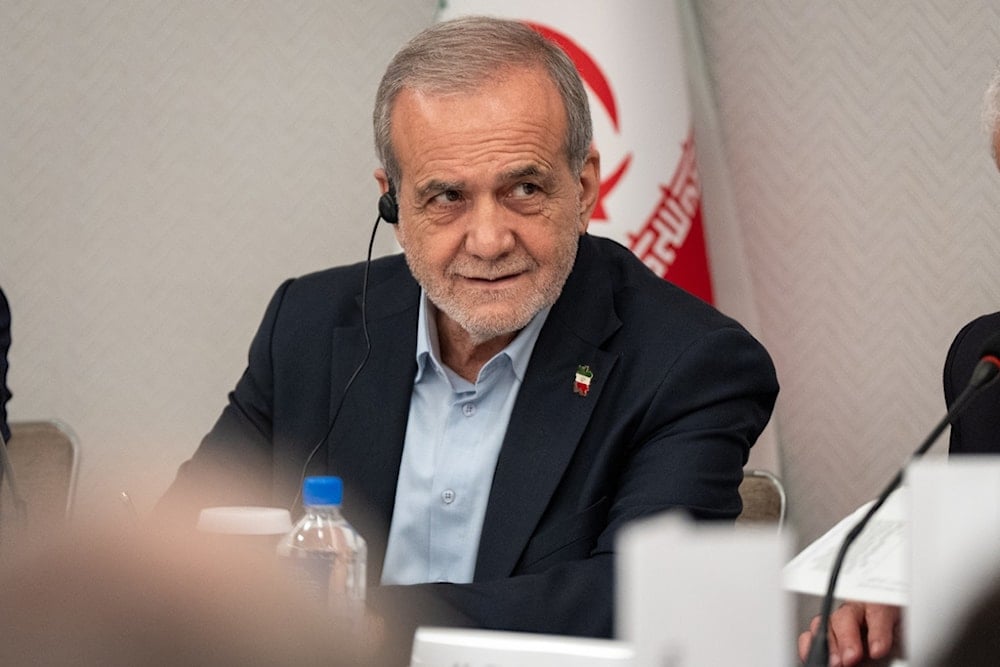Iran discusses Egypt’s invitation to Sharm El-Sheikh summit
Iran’s cabinet, led by President Masoud Pezeshkian, reviewed Egypt’s invitation to the Sharm El-Sheikh conference and approved a UN Cybercrime Convention proposal.
-

Masoud Pezeshkian, the president of Iran, takes questions from the media at a press briefing in New York, Friday, September 26, 2025. (AP)
Iran’s cabinet, led by President Masoud Pezeshkian, held a meeting on Sunday to discuss Egypt’s official invitation for the Iranian president to attend the upcoming Sharm El-Sheikh summit, according to a report presented by Foreign Minister Abbas Araghchi.
Araghchi informed the cabinet that while Egypt had extended an invitation to President Pezeshkian, Tehran declined the offer, opting instead to have the Iranian foreign minister represent the country at the event. The development marks a notable point in Iran-Egypt diplomatic relations, which have witnessed cautious engagement following years of limited contact.
The 118th meeting of the Pezeshkian administration also addressed a series of domestic and administrative matters, including ministry-level challenges and new executive regulations.
Iran backs endorsement of UN Cybercrime Convention
During the session, the cabinet approved the Foreign Ministry’s proposal to authorize the preliminary signing and temporary endorsement of the United Nations Convention against Cybercrime.
The international treaty aims to strengthen cooperation in combating crimes committed through information and communication technology systems and to facilitate the secure electronic exchange of evidence in serious criminal cases.
Iran’s endorsement of the convention signals its growing focus on cyber governance and cross-border cooperation to counter emerging digital threats.
Iran enhances ties to Egypt
Iranian Foreign Minister Abbas Araghchi affirmed in June that ongoing consultations and cooperation between Iran and Egypt, two pivotal regional countries, are beneficial and constructive.
During a meeting with Egyptian President Abdel Fattah El-Sisi, Araghchi expressed satisfaction with the increasing communication and official exchanges between the two nations over recent months, emphasizing the importance of collective and effective action by Islamic countries to deter the occupation and prevent further crimes in Gaza, as well as the escalation of aggression into Lebanon and Syria.
Highlighting the tragic situation in the Gaza Strip, Araghchi noted that the Palestinian people are enduring suffering as a result of ongoing mass massacres perpetrated by the Israeli occupation.
President Abdel Fattah El-Sisi reaffirmed Egypt's commitment to sustained coordination and bilateral engagement with Iran, emphasizing the foundation of shared interests and mutual respect. El-Sisi stated that there are efforts to end the genocide and killing of Palestinians in Gaza, reiterating Egypt's position in favor of de-escalating tensions across the region to achieve stability.
Following the meeting, Egyptian Presidential Spokesperson Mohamed el-Shenawy confirmed that both sides stressed the importance of continuing their current diplomatic path to explore opportunities for further development in their relationship.
Advancing bilateral and nuclear dialogue
Araghchi praised Egypt's efforts toward restoring regional stability and emphasized Iran’s commitment to sustained consultation in the coming period.
In a separate meeting with Egyptian Foreign Minister Badr Abdelatty, Araghchi noted that Iranian-Egyptian relations have advanced significantly, reaching a level not seen in previous years.
“There are no obstacles to Egyptian-Iranian relations,” Araghchi affirmed, noting that both Cairo and Tehran are working to expand political consultations. He also revealed a mutual agreement to increase trade exchange volumes between the two nations.
Reiterating Iran’s commitment to peace, Araghchi underscored that the country’s nuclear program is peaceful: "We are fully confident in that."
For his part, Foreign Minister Abdelatty noted that he and Araghchi discussed ways to further develop bilateral relations, regional security, and stability. He expressed Egypt’s full support for the US-Iran negotiations, aiming for a peaceful settlement of the nuclear issue.
Abdelatty stressed that Egypt’s foreign policy rejects military solutions, "Everyone would lose if a military conflict broke out in the region," affirming Egypt’s adherence to the principles of the Nuclear Non-Proliferation Treaty.

 4 Min Read
4 Min Read








